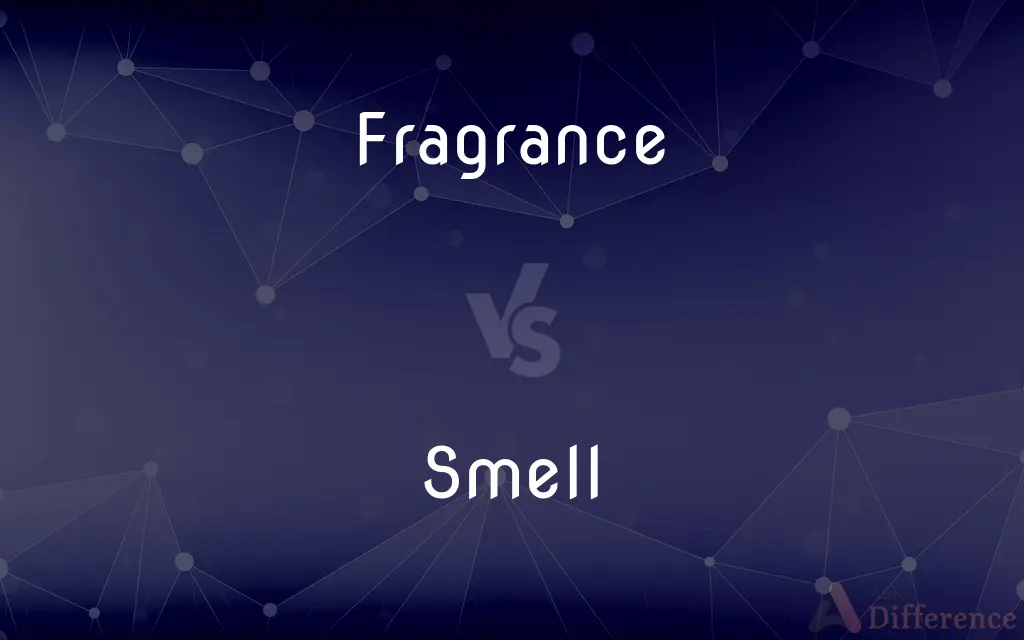Fragrance vs. Smell — What's the Difference?
By Fiza Rafique & Urooj Arif — Updated on April 23, 2024
Fragrance refers to a pleasant or sweet scent, often derived from natural sources or crafted in perfumes; smell encompasses any odor detectable by the nose, regardless of its nature.

Difference Between Fragrance and Smell
Table of Contents
ADVERTISEMENT
Key Differences
Fragrance is typically associated with pleasantness and is often used in products like perfumes and air fresheners to evoke specific feelings or memories. Smell, on the other hand, is a broader term that refers to any odor that can be detected by the olfactory senses, ranging from delightful to foul.
Fragrance is engineered to be appealing and is carefully composed using various scent notes in perfumery, often derived from flowers, spices, or fruits. Whereas smell does not discriminate between origins and can include unpleasant odors such as decay, chemicals, or smoke, which are not intentionally produced.
In marketing, the term fragrance is used to suggest quality and desirability, enhancing the perceived value of a product. Smell, however, is a neutral or technical term that simply denotes the ability to detect odors through the nose, without implying any particular quality.
The emotional response triggered by a fragrance can be deeply personal and positive, tied to specific experiences or memories. On the other hand, a smell can provoke a range of emotional reactions, from disgust to nostalgia, depending on its nature and personal associations.
Fragrance often plays a crucial role in cosmetics and home products, aiming to improve the user experience by adding a sensory appeal. In contrast, managing smells can be a critical task in environments like kitchens, hospitals, and waste management facilities, focusing on neutralization or masking unpleasant odors.
ADVERTISEMENT
Comparison Chart
Definition
A pleasant scent
Any odor detectable by the nose
Connotation
Positive, appealing
Neutral, can be positive or negative
Usage in products
Perfumes, candles, luxury items
All products with a scent component
Emotional response
Often positive, linked to luxury
Varies widely, not always positive
Intentionality
Crafted to be pleasant
Can be incidental or natural
Compare with Definitions
Fragrance
The quality of being aromatic.
The fragrance of her perfume lingered long after she left.
Smell
Any odor detectable by the nose.
The smell of baking bread wafted from the kitchen.
Fragrance
A distinctive, pleasant smell that identifies a substance or an environment.
The fragrance of pine was strong in the forest.
Smell
A property or quality of something that is perceived by the sense of smell.
The smell of chlorine reminded him of swimming pools.
Fragrance
A substance designed to emit a pleasant odor.
She added a dash of lavender fragrance to the homemade soap.
Smell
A faint trace of something.
There's a smell of damp in the basement.
Fragrance
A pleasant, sweet smell.
The fragrance of freshly cut roses filled the room.
Smell
The act of perceiving odors.
A dog's sense of smell is far superior to that of humans.
Fragrance
Perfume or cologne.
He gifted her a bottle of luxury fragrance for her birthday.
Smell
An unpleasant odor.
The smell of rotting food came from the fridge.
Fragrance
A pleasant, sweet smell
The fragrance of fresh-ground coffee
The bushes fill the air with fragrance
Smell
The sense, located in the nasal cavities of mammals and relying on the olfactory nerves, by which molecules borne in a fluid such as air can be perceived; the olfactory sense.
Fragrance
The quality of having a pleasant odor
The fragrance of the ocean breeze.
Smell
A similar sense in other animals, as insects' ability to perceive air-borne molecules with their antennae.
Fragrance
A sweet or pleasant odor; a scent.
Smell
The act or an instance of smelling
Got a smell of the pie.
Fragrance
A substance, such as a perfume or cologne, designed to emit a pleasant odor.
Smell
A quality of something that is perceived by the sense of smell; an odor
The smell of a barn.
Fragrance
A pleasant smell or odour.
Smell
A distinctive enveloping or characterizing quality; an aura or trace
The smell of success.
Fragrance
(transitive) To apply a fragrance to; to perfume.
Smell
To perceive (an odor) by the sense of smell.
Fragrance
The quality of being fragrant; sweetness of smell; a sweet smell; a pleasing odor; perfume.
Eve separate he spies,Veiled in a cloud of fragrance.
The goblet crowned,Breathed aromatic fragrancies around.
Smell
To perceive or detect (something) by a chemosensory organ, such as an antenna.
Fragrance
A distinctive odor that is pleasant
Smell
To inhale the air near (something); sniff
Smiled as she smelled the rose.
Fragrance
A pleasingly sweet olfactory property
Smell
To detect or discover, as by intuition or inference
We smelled trouble ahead. The committee tried to smell out corruption in law enforcement.
Smell
To use the sense of smell.
Smell
To sniff
The dog was smelling around the bed.
Smell
To have or emit an odor
"The breeze smelled exactly like Vouvray—flowery, with a hint of mothballs underneath" (Anne Tyler).
Smell
To have or emit an unpleasant odor; stink
This closet smells.
Smell
To be suggestive; have a touch of something
A remark that smells of sanctimony.
Smell
To appear to be dishonest or corrupt
The political situation is starting to smell.
Smell
A sensation, pleasant or unpleasant, detected by inhaling air (or, the case of water-breathing animals, water) carrying airborne molecules of a substance.
I love the smell of fresh bread.
Smell
(physiology) The sense that detects odours.
Smell
(transitive) To sense a smell or smells.
I can smell fresh bread.
Smell the milk and tell me whether it's gone off.
Smell
Followed by like or of if descriptive: to have a particular smell, whether good or bad.
The roses smell lovely.
Her feet smell of cheese.
The drunkard smelt like a brewery.
Smell
To smell bad; to stink.
Ew, this stuff smells.
Smell
To have a particular tincture or smack of any quality; to savour.
A report smells of calumny.
Smell
To detect or perceive; often with out.
Smell
(obsolete) To give heed to.
Smell
(transitive) To smell of; to have a smell of
Smell
To perceive by the olfactory nerves, or organs of smell; to have a sensation of, excited through the nasal organs when affected by the appropriate materials or qualities; to obtain the scent of; as, to smell a rose; to smell perfumes.
Smell
To detect or perceive, as if by the sense of smell; to scent out; - often with out.
Can you smell him out by that?
Smell
To give heed to.
From that time forward I began to smellthe Word of God, and forsook the school doctors.
Smell
To affect the olfactory nerves; to have an odor or scent; - often followed by of; as, to smell of smoke, or of musk.
Smell
To have a particular tincture or smack of any quality; to savor; as, a report smells of calumny.
Praises in an enemy are superfluous, or smell of craft.
Smell
To exercise the sense of smell.
Smell
To exercise sagacity.
Smell
The sense or faculty by which certain qualities of bodies are perceived through the instrumentally of the olfactory nerves. See Sense.
Smell
The quality of any thing or substance, or emanation therefrom, which affects the olfactory organs; odor; scent; fragrance; perfume; as, the smell of mint.
Breathing the smell of field and grove.
That which, above all others, yields the sweetest smell in the air, is the violent.
Smell
The sensation that results when olfactory receptors in the nose are stimulated by particular chemicals in gaseous form;
She loved the smell of roses
Smell
Any property detected by the olfactory system
Smell
The general atmosphere of a place or situation and the effect that it has on people;
The feel of the city excited him
A clergyman improved the tone of the meeting
It had the smell of treason
Smell
The faculty of smell
Smell
The act of perceiving the odor of something
Smell
Inhale the odor of; perceive by the olfactory sense
Smell
Emit an odor;
The soup smells good
Smell
Smell bad;
He rarely washes, and he smells
Common Curiosities
What does smell refer to?
Smell refers to any odor, whether pleasant or unpleasant, that can be detected by the olfactory system.
What is a fragrance?
A fragrance is a pleasant and deliberately created scent often used in various products to enhance their appeal.
Are all smells fragrances?
No, not all smells are fragrances; smells can be neutral or unpleasant as well.
What is meant by 'smell' in scientific terms?
In scientific terms, smell refers to the detection and identification of volatile substances by the olfactory system.
Can smells affect mood?
Yes, smells can significantly affect mood, with pleasant smells enhancing mood and unpleasant ones potentially causing discomfort.
What is aroma therapy?
Aromatherapy is the practice of using natural oils and fragrances to promote physical and psychological well-being.
What causes a bad smell?
Bad smells can be caused by decay, chemical reactions, or the presence of pollutants.
How can a bad smell be managed?
Bad smells can be managed through ventilation, cleaning, or using neutralizers and air fresheners.
How do people react differently to the same smell?
Individual reactions to smells can vary greatly due to personal associations, memories, and even genetic differences in smell perception.
What makes a fragrance appealing?
A fragrance is made appealing by its composition of scent notes that are pleasing to the sense of smell.
Why do some people dislike certain fragrances?
Some people may dislike certain fragrances due to personal preferences, allergies, or negative associations with the scent.
Can a fragrance be a smell?
Yes, a fragrance is a type of smell, specifically one that is pleasant.
How are fragrances used in products?
Fragrances are added to products like perfumes, lotions, and candles to give them a pleasant scent.
Is the sense of smell important?
Yes, the sense of smell is crucial for detecting hazards, enjoying foods, and experiencing environments.
Are there unscented products free from smells?
Unscented products are designed to be free from added fragrances, though they may still have a slight natural scent.
Share Your Discovery

Previous Comparison
Cleft vs. Cliff
Next Comparison
Objective vs. SubjectiveAuthor Spotlight
Written by
Fiza RafiqueFiza Rafique is a skilled content writer at AskDifference.com, where she meticulously refines and enhances written pieces. Drawing from her vast editorial expertise, Fiza ensures clarity, accuracy, and precision in every article. Passionate about language, she continually seeks to elevate the quality of content for readers worldwide.
Co-written by
Urooj ArifUrooj is a skilled content writer at Ask Difference, known for her exceptional ability to simplify complex topics into engaging and informative content. With a passion for research and a flair for clear, concise writing, she consistently delivers articles that resonate with our diverse audience.















































